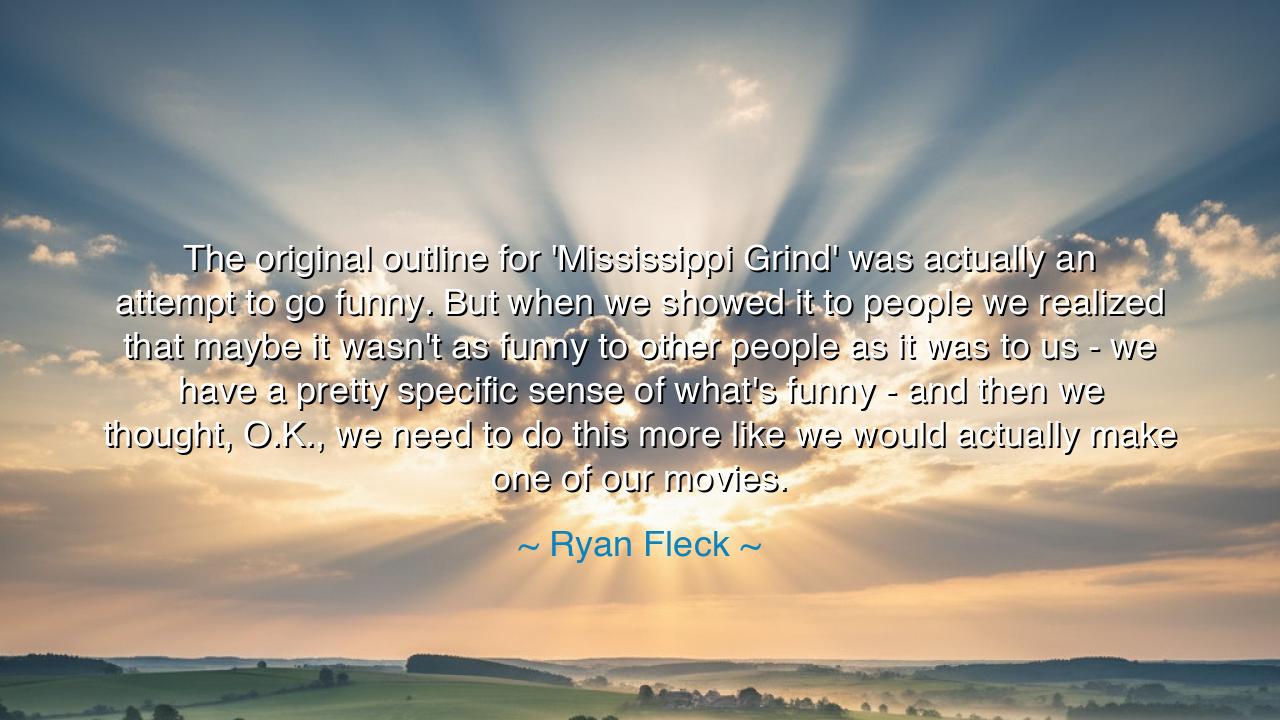
The original outline for 'Mississippi Grind' was actually an
The original outline for 'Mississippi Grind' was actually an attempt to go funny. But when we showed it to people we realized that maybe it wasn't as funny to other people as it was to us - we have a pretty specific sense of what's funny - and then we thought, O.K., we need to do this more like we would actually make one of our movies.






Hear, O seekers of craft and purpose, the words of Ryan Fleck, a maker of stories who walked the path between laughter and truth. He said: “The original outline for ‘Mississippi Grind’ was actually an attempt to go funny. But when we showed it to people we realized that maybe it wasn’t as funny to other people as it was to us—we have a pretty specific sense of what’s funny—and then we thought, O.K., we need to do this more like we would actually make one of our movies.” In these words lies the eternal lesson of the artist’s journey: the realization that authenticity is the foundation of meaning, and that the work born from one’s true nature will always shine brighter than the work made to please others.
Fleck, who co-created the film Mississippi Grind with his long-time partner Anna Boden, speaks here not only of filmmaking, but of the act of creation itself—the tension between intention and realization, between what we think will move others and what truly comes from within. He tells of beginning the project with humor, seeking lightness and laughter, as many artists do when they wish to entertain. But upon showing their work to the world, they discovered that the laughter did not come—that what amused them in private did not ignite the same spark in others. It is a moment of reckoning that every creator faces: when the mirror of the audience reflects not approval, but silence. Yet it is in that silence that wisdom is born.
For Fleck did not despair. Instead, he and Boden listened to what the silence taught them. They realized that their “specific sense of what’s funny” was not universal, and more importantly, that it was not the truest voice of their art. Their greatest strength lay not in imitation or in chasing trends, but in the quiet, soulful realism that defined their earlier works—stories that dwelled in the human heart, in its struggles and small triumphs. Thus, he says, they resolved to “do this more like we would actually make one of our movies.” It was not a retreat, but a return—a homecoming to authenticity.
The ancients would have nodded in agreement, for this truth is as old as creation itself. Consider Socrates, who was once mocked by playwrights for his peculiar manner of questioning, for turning philosophy into dialogue rather than lecture. Many thought him absurd; few understood him. Yet he persisted, saying, “Know thyself,” and from that simple command grew the root of all wisdom. Ryan Fleck’s realization mirrors this same principle. To create without knowing one’s true nature is to wander in shadow; to create from one’s own essence is to bring forth light. When he and his partner chose to abandon the false pursuit of easy laughter, they embraced the Socratic art of self-knowledge, and their film became not an imitation, but an expression of truth.
There is humility in this moment of recognition, and also courage. It is no small thing to admit that something does not work, that what delights us may not resonate with others. Yet this humility is not defeat—it is transformation. The artist who listens to failure with an open heart becomes wiser, sharper, truer. Many have ignored such lessons and been consumed by pride. But those who accept them, like Fleck, find the road to mastery. In art, as in life, to return to your nature is to find your voice, and to find your voice is to find peace.
Let us look, too, to another example: Vincent van Gogh, who painted in colors that others called madness. His art was not “fashionable”; it was personal, intimate, born of his own vision. The world did not laugh—it looked away. Yet he painted still, following not the applause of others, but the fire of his own soul. Only after his death did the world finally see that his colors were not madness, but revelation. Ryan Fleck’s story is a quieter echo of that truth: that art born from sincerity may not please all, but it will endure longer than art born from imitation.
Therefore, take this teaching into your own heart: do not create merely to please; create to be true. When you labor to make others laugh or admire you, you risk losing the thread of your own spirit. But when you act, write, or live according to your nature—when you make your “movie” in the way only you can—then even if the world does not cheer, your work will still carry the weight of honesty, and honesty never fades. Fleck’s words remind us that the artist’s greatest triumph is not applause, but alignment—with self, with truth, with the divine spark that first called them to create.
So, my child of creation, when you find yourself lost in the noise of expectation, remember this: step back, breathe, and return to your essence. Ask not, “Will they like this?” but “Is this me?” For the world does not need more entertainers—it needs more truth-tellers. And in choosing authenticity over approval, as Ryan Fleck did, you will discover what every master has known since the dawn of art—that the truest work may not always bring laughter, but it will always bring light.






AAdministratorAdministrator
Welcome, honored guests. Please leave a comment, we will respond soon